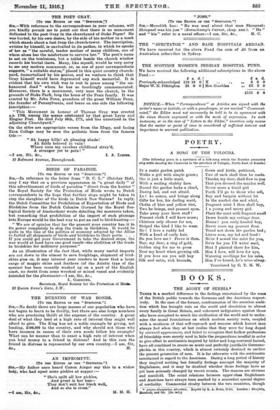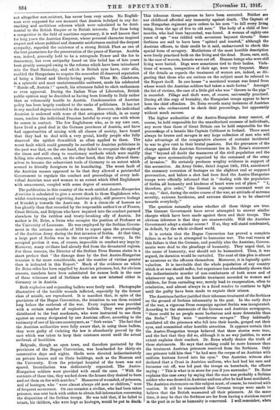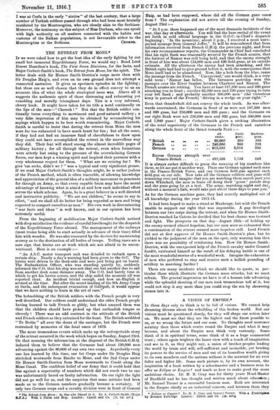BOOKS.
TILE AGONY OF SERBIA.* THERE is a marked difference in the feelings entertained by the man of the British public towards the Germans and the Austrians respect- ively. In the case of the former, condemnation of the senseless ambi- tion which has brought ruin on the world and desolation to almost every family in Great Britain, and vehement indignation against those who have conspired to wreck the civilization of the world and to under. mime the moral foundations on which modern society rests, coupled with a modicum of that self-reproach and remorse which honest men always fool when they at last realize that they were for long duped by outward appearances, and failed to recognize that hollow professions of friendship were merely used to hide the preparations needful in order to give effect to sentiments inspired by bitter and long-nurtured hatred, have all combined to oroate an acute and perfectly justifiable Germano. phobia in this country, which is almost certainly destined to outlive the present generation of men. It is far otherwise with the sentiments entertained in regard to the Auetrians. During a long period of history they inspired nothing but friendly feelings amongst the majority of Englishmen, and it may be doubted whether those feelings have as yet been seriously changed by recent events. The reasons arc obvious and manifold. The social relations between upper-class Englishmen and Austrians have always been marked by a somewhat special degree of cordiality. Coramercial rivalry between the two countries, though
• Andre-Hungarian Atrocities. Report by U. A. Reba, D.Sc. London : Manhall, and Co. [Se. act4
not altogether non-existent, has never been very acute. No English- man ever supposed for one moment that Austria indulged in any far- reaching and ambitious schemes which were calculated to be detri- mental to the British Empire or to British interests. Far from being a competitor in the field of maritime supremacy, it is well known that for long years the Austrian Emperor, whose personal character inspired respect and whose political and domestic misfortunes excited the deepest sympathy, regarded tho existence of a strong British Fleet as one of the best guarantees for the preservation of the peace of Europe. Austria was, indeed, generally held to be a retrograde Power and the foe to democracy, but even antipathy based on this belief has of late years been greatly assuaged owing to the reforms which have been introduced into the Dual Monarchy, and wh:ch in British eyes have, inter alia, enabled the Hungarians to acquire the somewhat ill-deserved reputation of being a liberal and liberty-loving people. When Mr. Gladstone, in a splenetic and most unstatesmanlike outburst, made his celebrated " Hands off, Austria ! " speech, his utterance failed to elicit enthusiasm or even approval. During the Italian Wars of Liberation, British public opinion may be described as having been friendly to Italy rather than as vehemently hostile to Austria. Condemnation of Austrian policy has been largely confined to the ranks of politicians. It has not in any marked degree extended to the masses. Moreover, the individual Austrian is endowed with none of that arrogance which, in so many cases, renders the individual Prussian hateful to every one with whom he comes in contact. The few Englishmen who, as in my own case, have lived a good deal in the German provinces of Austria, and have had opportunities of mixing with all classes of society, have found that they had to deal with a very genial, kindly people who fully deserved the epithet Gemiithlieh so often applied to them. The worst fault which could generally be ascribed to Austrian politicians in the past was that, on the one hand, they failed to recognize the signs of the times and still clung to reactionary methods which were rapidly falling into abeyance, and, on the other hand, that they allowed them- selves to become the subservient tools of Germany to an extent which seemed to friendly foreigners to be humiliating. The worst fault of the Austrian masses appeared to be that they allowed a patriarchal Government to regulate the conduct and proceedings of every indi- vidual Austrian man and woman to an extent which filled Englishmen with amazement, coupled with some degree of amusement.
The publication in this country of the work entitled Austro-Hungarian Atrocities is calculated to give a severe shock to those Englishmen who, whilst condemning and regretting Austrian policy, still preserve feelings of fr:endsh:p towards the Austr:ans. It is a chron:cle of horrors no less ghastly than that recorded by the responsible author:t:es of France, Great Britain, and Belgium who have inquired into the conduct pursued elsewhere by the ruthless and treaty-breaking ally of Austria. Its author is Dr. Reiss, a Swiss who occupies the position of Professor at the University of Lausanne. He was employed by the Serbian Govern- ment in the autumn months of 1914 to report upon the proceedings of the Austrian Army during the first invasion of Serbia. At that time, a large part of Serbia was in the occupation of the enemy. In the occupied portion it was, of course, impossible to conduct any inqu:ry. Moreover, many civilians had already fled from the devastated regions. For these reasons, the Director of the Serbian Press Bureau states in a short preface that "the damage done by the first Austro-Hungarian invasion is far more considerable, and the number of victims greater than is indicated in this Report." Much of the evidence on which Dr. Reiss relies has been supplied by Austrian prisoners, but, for obvious reasons, numbers have been substituted for names both in the case of these witnesses and of Serbians who are now interned either in Germany or in Austria.
Both explosive and expanding bullets were freely used. Photographs illustrative of the terrible wounds inflicted, especially by the former class of missile, are reproduced. It is manifest that, in spite of the provisions of the Hague Convention, the intention to use them existed long before the outbreak of the war. Every regiment was provided with a certain number of explosive bullets. They were generally distributed to the beat marksmen, who were instructed to use them against an enemy designated by one Austrian officer, according to the testimony of one of his own countrymen, as "Serb swine." The fact that the Austrian authorities were fully aware that, in using these bullets, they were guilty of violating the law is abundantly proved by the care which was taken to keep their existence secret until the actual outbreak of hostilities.
Belgrade, though an open town, and therefore protected by the provisions of the Hague Convention, was bombarded for thirty-six consecutive days and nights. Shells were directed indiscriminately on private houses and on State buildings, such as tho Museum and the University. Even the principal hospital of the town was not spared. Incendiaxism was deliberately organized. The Austro- Hungarian soldiers were provided with small tin cans. "With the contents of these tins, they washed down the houses they desired to burn and set them on fire with matches." Massacres of wounded, of prisoners, and of hostages, who "were almost always old men or children," were of frequent occurrence. On one occasion a civilian, who had been taken prisoner, was sent back with orders to obtain full information concerning the disposition of the Serbian troops. He was told that, if he failed to return, his children, who were kept as hostages, would be put to death.
This inhuman threat appears to have been executed. Neither sex nor childhood afforded any immunity against death. • The Captain of one Hungarian regiment gave orders to his men "to kill every living being, from the ago of five to old men." The body of a child of four months, who had been bayoneted, was found. A woman of eighty-one years of age "was riddled with seventeen bayonet thrusts." Some Serbians are said to have been "spitted and roasted," although the Austrian officers, to their credit be it said, endeavoured to cheek this special form of savagery. Mutilations of the most horrible description were freely practised both on the living and the deed. Noses, ears, and, in tie ease of women, breasts were cut off. Human beings who were still living were buried. Dogs were sometimes tied to their bodies. Viola- tions of women, irrespective of their age, were very frequent. Many of the details as regards the treatment of women are, indeed, so dis- gusting that those who are curious on the subject must be referred to the Report itself. In one house "a murdered woman was found from whose womb the Austrian soldiers had taken a male foetus." Amongst the list of victims, the case of a little girl who was "thrown to the pigs" is recorded. Pillage and theft were, of course, universally practised. During all this orga, of brutality, the Hungarian troops appear to have been the chief offenders. Dr. Reiss records many instances of Austrian officers who endeavoured to cheek their proceedings, but apparently without much emcees.
The higher authorities of the Austro-Hungarian Army cannot, of course, be held responsible for the unauthorised excesses of individuals, any more than those of Great Britain can be held responsible for the proceedings of a lunatic like Captain Colthtust in Ireland. There must always be brutes and savages in any large collection of men who will take advantage of the comparative absence of restraint incidental to war to give vent to their brutal passions. But the gravamen of the charge against the Austrian Government lies in Dr. Robe's statement that "beyond all doubt the massacres of the civil population and the pillage were systematically organized by the command of the army of invasion." He certainly produces weighty evidence in support of this accusation. An Army Order, dated August 14th, 1914, sanctioned the summary execution of hostages on the slightest real or supposed provocation, and before a shot had been fired the Austro-Hungarian troops were officially informed that in "dealing with the population of Serbia all humanity and kindness of heart were out of place." " therefore, give order," the General. in supreme command went on to say, "that, during the entire course of the war, an attitude of extreme severity, extreme harshness, and extreme distrust is to be observed towards everybody."
The question naturally arises whether all these things are true. The German Government have never attempted to answer similar charges which have been made against them and their troops. The obvious inference is that they are unanswerable. Will the Austrian Government adopt a similar course ? If so, they will stand condemned, in default, by the whole civilized world.
It is certain that the Hague Convention has proved a complete failure in so far as it attempted to humanize war. The real reason of this failure is that the German, and possibly also the Austrian, Govern- ments were deaf to the pleadings of humanity. They urged that, in the name of humanity, war should not be humanized. Thus, it was argued, its duration would be curtailed. The cant of this plea is almost as nauseous as the offences themselves. Moreover, it is logically quite valueless. It is inevitable that the whole population of any country which is at war should suffer, but experience has abundantly shown that the indiscriminate murder of non-combatants of both sexes and of whatsoever age, and the horrible treatment accorded to women and children, far from curtailing war, merely lead to exasperation, often to retaliation, and almost always to a fixed resolve to continue to fight until the guilty have been made to expiate their crimes.
The Austrians further justified their inhuman treatment of the Serbians on the ground of Serbian inhumanity in the past. In the early days of the war, a vigorous Press campaign against Serbia was inaugurated. According to the statements of the German and Austrian newspapers, "there could be no people more barbarous and more detestable than the Serbs." They were "murderous savages." They habitually mutilated all the prisoners who fell into their hands, gouged out their eyes, and committed other horrible atrocities. It appears certain that the Austro-Hungarian troops believed that these stories were true, and the fact that they did so, although it in no way justifies, to some extent explains their conduct. Dr. Reiss wholly denies the truth of these statements. He says that nothing could be more humane than the treatment Austrian prisoners received from the Serbians. Only one prisoner told him that "he had seen the corpse of an Austrian with uniform buttons forced into his eyes." One Austrian witness also declared that a Croat in Austrian uniform, who had had his ears and forearms cut off, was led past the troops on horseback, the officers saying : " This ia what is in store for you if you surrender." Dr. Reiss explains this case away by saying that the man was probably a Serbian soldier who was dressed in Austrian uniform after he had been mutilated. The Austrian statements on this subject must, of course, be received with caution. It will be remembered that German troops were made to believe that the British massacred all their prisoners. At the same time, it may be that the Serbians are far from having a stainless record in the past in so far as humanity is concerned. I well remember, when
I was at Corfu in the early " sixties " of the last century, that a large number of Turkish soldiers passed through who had been most brutally mutilated by the Montenegrins, who are closely akin to the Serbians. Moreover, the testimony on this subject of Miss Durham, who can speak with high authority on all matters connected with the habits and customs of the Balkan populations, is not favourable either to the




































 Previous page
Previous page